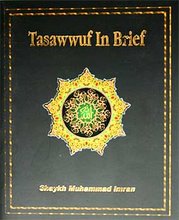Saturday, 25 December 2010
Sunday, 29 August 2010
Wednesday, 11 August 2010
Cleansing and Adorning Oneself in the Month of Ramadan
A brief insight to the islahi majlis of My Respected Teacher, Shaykh Imran ibn Adam
Sunday 8th August 2010
It is a principle of all things in this world that nothing can become perfect until it is cleared of all defective aspects. For example, no plant will grow perfectly until it's place of growth is cleared of all harmful features. Likewise, paint can not be applied to a car until the rust is cleared off. Like this, we can apply this principle to all areas. In the same way, we must clear our lives of all defective actions and carry out righteous acts which will then build us up to becoming good people.
So, on one hand we have the "munakaraat" i.e. those things that are forbidden, and on the other hand we have the "ma'muraat" i.e. those things that we have been commanded to do. The former are the defective aspects that we must avoid, and the latter are the righteous acts that we must adopt. We must do takhliya (cleansing) of the former and do tahliya (adorning) by means of the latter.
The blessed month of Ramadan contains practice for us for this process. As soon as the moon is sighted for the beginning of Ramadan, twenty cycles (raka'at) of salah is enjoined upon us in which a servant performs forty prostrations (sujud) for his Lord by which he draws near to Allah Most High, as Allah mentions in the Noble Qur'an: "...prostrate and draw closer" (Al-Alaq 19). Furthermore, it has been narrated from Abu Huraira (Allah be pleased with him) that the Messenger of Allah (Allah bless him and give him peace) said, "The closest a servant is to his Lord is when he is prostrating (i.e. doing sajda)..." (Muslim). In addition, we are encouraged do carry out other good acts in this month, like recitation of the Qur'an, spending in charity etc. So all of this is adornment (tahliya) of oneself.
Thereafter, during the day we are commanded to keep fast and staying away from food and drink is a way of curbing the desires in a person. This is practice to help a person to stay away from the forbidden things because if he can stay away from those things that are usually permissible for him (i.e. food and drink) then of course he should be able to refrain from the forbidden things- and this is the real objective. It is reported from Abu Huraira (Allah be pleased with him) that Allah's Messenger (Allah bless him and give him peace) said: "Whoever does not leave speaking falsehood and acting thereupon, Allah has no need (i.e. does not accept) of him leaving his food and drink" (Bukhari).
This shows clearly that until one does not cleanse himself of evil and vice, righteous acts will not yield the best results.
Hakim al-Umma Mawlana Ashraf Ali Thanawi (Allah have mercy on him) has mentioned that it becomes easier to leave sin during the month of Ramadan. Man has two things urging him to sin; one is Satan and the other is man's nafs (desires). One provocation is locked away: Satan [as mentioned in various ahadith]. What's more, even the second provocation (nafs) is weakened by means of fasting.
In conclusion, the aim of Ramadan is to create taqwa by means of which one will be able to refrain from sin and as a result any virtuous acts one carries out will yield abundant good.
Sunday 8th August 2010
It is a principle of all things in this world that nothing can become perfect until it is cleared of all defective aspects. For example, no plant will grow perfectly until it's place of growth is cleared of all harmful features. Likewise, paint can not be applied to a car until the rust is cleared off. Like this, we can apply this principle to all areas. In the same way, we must clear our lives of all defective actions and carry out righteous acts which will then build us up to becoming good people.
So, on one hand we have the "munakaraat" i.e. those things that are forbidden, and on the other hand we have the "ma'muraat" i.e. those things that we have been commanded to do. The former are the defective aspects that we must avoid, and the latter are the righteous acts that we must adopt. We must do takhliya (cleansing) of the former and do tahliya (adorning) by means of the latter.
The blessed month of Ramadan contains practice for us for this process. As soon as the moon is sighted for the beginning of Ramadan, twenty cycles (raka'at) of salah is enjoined upon us in which a servant performs forty prostrations (sujud) for his Lord by which he draws near to Allah Most High, as Allah mentions in the Noble Qur'an: "...prostrate and draw closer" (Al-Alaq 19). Furthermore, it has been narrated from Abu Huraira (Allah be pleased with him) that the Messenger of Allah (Allah bless him and give him peace) said, "The closest a servant is to his Lord is when he is prostrating (i.e. doing sajda)..." (Muslim). In addition, we are encouraged do carry out other good acts in this month, like recitation of the Qur'an, spending in charity etc. So all of this is adornment (tahliya) of oneself.
Thereafter, during the day we are commanded to keep fast and staying away from food and drink is a way of curbing the desires in a person. This is practice to help a person to stay away from the forbidden things because if he can stay away from those things that are usually permissible for him (i.e. food and drink) then of course he should be able to refrain from the forbidden things- and this is the real objective. It is reported from Abu Huraira (Allah be pleased with him) that Allah's Messenger (Allah bless him and give him peace) said: "Whoever does not leave speaking falsehood and acting thereupon, Allah has no need (i.e. does not accept) of him leaving his food and drink" (Bukhari).
This shows clearly that until one does not cleanse himself of evil and vice, righteous acts will not yield the best results.
Hakim al-Umma Mawlana Ashraf Ali Thanawi (Allah have mercy on him) has mentioned that it becomes easier to leave sin during the month of Ramadan. Man has two things urging him to sin; one is Satan and the other is man's nafs (desires). One provocation is locked away: Satan [as mentioned in various ahadith]. What's more, even the second provocation (nafs) is weakened by means of fasting.
In conclusion, the aim of Ramadan is to create taqwa by means of which one will be able to refrain from sin and as a result any virtuous acts one carries out will yield abundant good.
Sunday, 8 August 2010
Wednesday, 21 July 2010
Thursday, 24 June 2010
Tuesday, 20 April 2010
Wednesday, 10 March 2010
Trust in Allah and Adopting the Means
In this week's discourse, my Respected Teacher explained the vital issue of drawing a balance between having reliance in Allah Most High and adopting necessary means in our affairs.
This issue stemmed from the narration of the Messenger of Allah (Allah bless him and give him peace) in which he advises us not walk in one shoe, and another in which he advises us to extinguish any fires around the home before retiring to bed at night. Amongst the wisdoms of not walking in one shoe is to save oneself from any injuries, and in extinguishing any fires one puts out any apparent risk of catastrophe.
We see here, and in many teachings of the Mercy to the Worlds (Allah bless him and give him peace), that we have been instructed to adopt the necessary means for our affairs. To be totally reliant on the apparent means is a wayward approach, and also, it is not desired that one completely abandons all means in the name of reliance upon Allah Most High.
As always, the middlemost path is the one that is to be sought. Allah guide us thereupon.
This issue stemmed from the narration of the Messenger of Allah (Allah bless him and give him peace) in which he advises us not walk in one shoe, and another in which he advises us to extinguish any fires around the home before retiring to bed at night. Amongst the wisdoms of not walking in one shoe is to save oneself from any injuries, and in extinguishing any fires one puts out any apparent risk of catastrophe.
We see here, and in many teachings of the Mercy to the Worlds (Allah bless him and give him peace), that we have been instructed to adopt the necessary means for our affairs. To be totally reliant on the apparent means is a wayward approach, and also, it is not desired that one completely abandons all means in the name of reliance upon Allah Most High.
As always, the middlemost path is the one that is to be sought. Allah guide us thereupon.
Wednesday, 17 February 2010
Tuesday, 9 February 2010
Monday, 11 January 2010
Wednesday, 23 December 2009
Monday, 23 November 2009
Allah's Mercy Seeks an Excuse
Here is an insight to what My Respected Teacher mentioned in the Jumu'ah sermon on 20/11/2009:
Allah Most High says in the Noble Qur'an:
The Blessed days of Dhu 'l-Hijjah
Allah Most High says in the Noble Qur'an:
'...and man was created weak.' (Qur'an 4:28)
Man is weak in terms of opposing his desires and remaining steadfast upon the obedience of Allah Most High. Anas ibn Malik (Allah be pleased with him) reported that the Prophet Muhammad (Allah bless him and give him peace) said:
'The children of Adam are all profuse wrongdoers, but the best of profuse wrongdoers are those who repent.' (Ibn Majah, Tirmidhi)
One wisdom behind man being weak is so that he may invoke the vast mercy of Allah Most High. There is virtually nothing more beloved to Allah Most High than when His servant repents in all sincerity to Him so that He may forgive him. Allah has set out countless 'excuses' to forgive the wrongs of His servants; following are a few examples from the sayings of the Messenger of Allah (Allah bless him and give him peace):
'Whoever performs ablution, and perfects the ablution, his sins leave from his body to the extent that even from beneath his nails.' (Bukhari, Muslim)
'The five prayers, jumu'ah to jumu'ah, Ramadan to Ramadan, are expiators for those [sins committed] in between if the enormities are avoided.' (Muslim)
'No strain, illness, worry, grief, pain, afflicts a Muslim, to the extent that even a thorn that pricks him- except that Allah removes his sins as a result of it.' (Bukhari, Muslim)
'Whoever fasts in Ramadan with Faith, anticipating reward, his past sins are forgiven. Whoever stands in prayer in Ramadan with Faith, anticipating reward, his past sins are forgiven. Whoever stands in prayer in Laylat al-Qadr with Faith, anticipating reward, his past sins are forgiven.' (Bukhari, Muslim)
'Whoever performs the pilgrimage for Allah and does not behave obscenely nor commits sin returns [free from sin] like the day his mother gave birth to him.' (Bukhari, Muslim)
These are just a few examples of the mercy of Allah Most High seeking out an excuse. Yes, for the enormities one commits one must repent with remorse to Allah and resolve never to commit that sin again, as well as fulfil any rights of anyone that have been neglected.
The Blessed days of Dhu 'l-Hijjah
These blessed ten days of Dhu 'l-Hijjah are another such occasion of the manifestation of the mercy of Allah Most High. Abu Hurairah (Allah be pleased with him) reported that the Messenger (Allah bless him and give him peace) said:
'There are no days Allah loves to be worshipped in more than the ten of Dhu 'l-Hijjah; the fasting of each day amounts to the fasting of a year and standing in prayer in each of its nights amounts to standing in prayer in Laylat al-Qadr.' (Tirmidhi)
These days should be spent in:
1) Fasting (See above hadith)
2) Standing in prayer at night (See above hadith)
3) Glorifying Allah (tasbeeh: saying Subhan Allah), expressing the greatness of Allah (takbeer: saying Allahu Akbar), proclaiming His oneness (tahleel: saying La Ilaha Illa Allah), and praising Him (tahmeed: saying Alhamdu lillah).
Sayyiduna Abd Allah ibn Umar reported that the Prophet (Allah bless him and give him peace) said:
'There are no days in which actions are more valued or more beloved to Allah than in the ten days [of Dhu 'l-Hijjah]; thus, during these express tasbeeh, tahmeed, tahleel, and takbeer in abundance.' (Tabarani in al-Mu'jam al-Kabeer)
4) Sacrificing an animal (on the Day of Sacrifice)
Sayyidah A'ishah (Allah be pleased with her) reported that Allah's Messenger (Allah bless him and give him peace) said:
'On the Day of Sacrifice, the son of Adam carries out no action more beloved to Allah than shedding the blood [of a sacrificial animal]...' (Tirmidhi)
It has also been reported that a persons sins are forgiven when the first drop of the animal's blood falls to the ground (Bazzaar)
Allah Most High give us the ability to value these days.
Sunday, 1 November 2009
Whispers of Shaytan
In the monthly Spiritual Gathering on Saturday, 31st October, my Respected Teacher mentioned three things that can aid a person in the fight against satanic whispers (wasawis):
1) To remain in the state of purity (with wudu) as much as possible.
2) To ask Allah Most High for His help. One should recite the following verse:
1) To remain in the state of purity (with wudu) as much as possible.
2) To ask Allah Most High for His help. One should recite the following verse:
رَبِّ أعُوْذُ بِكَ مِنْ هَمَزَاتِ الشَّيَاطِيْنِ وَأعُوْذُ بِكَ رَبِّ أن يّحْضُرُوْنِ
3) To avert one's attention towards something positive.
Monday, 26 October 2009
Friday, 2 October 2009
Saturday, 19 September 2009
Subscribe to:
Posts (Atom)



















